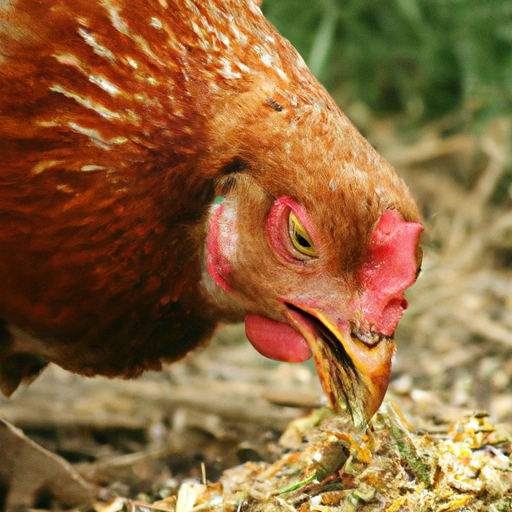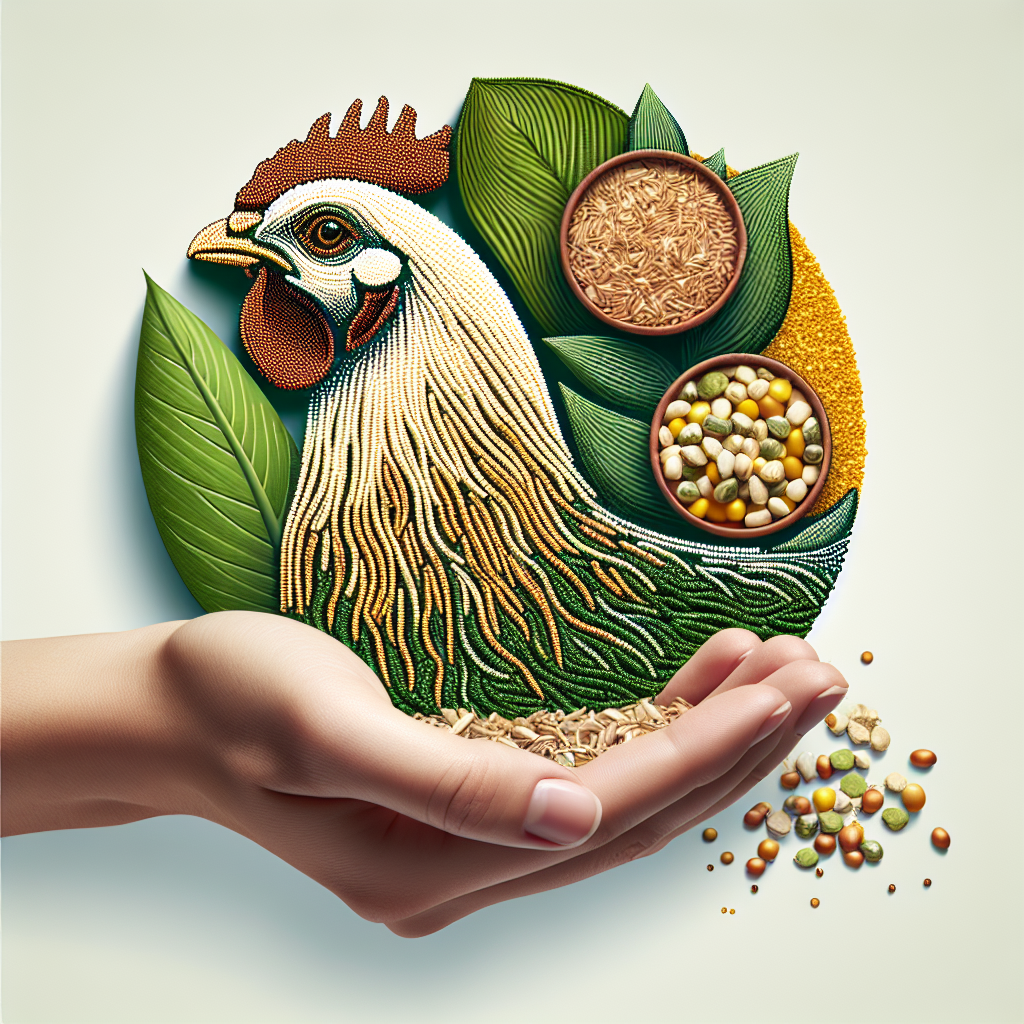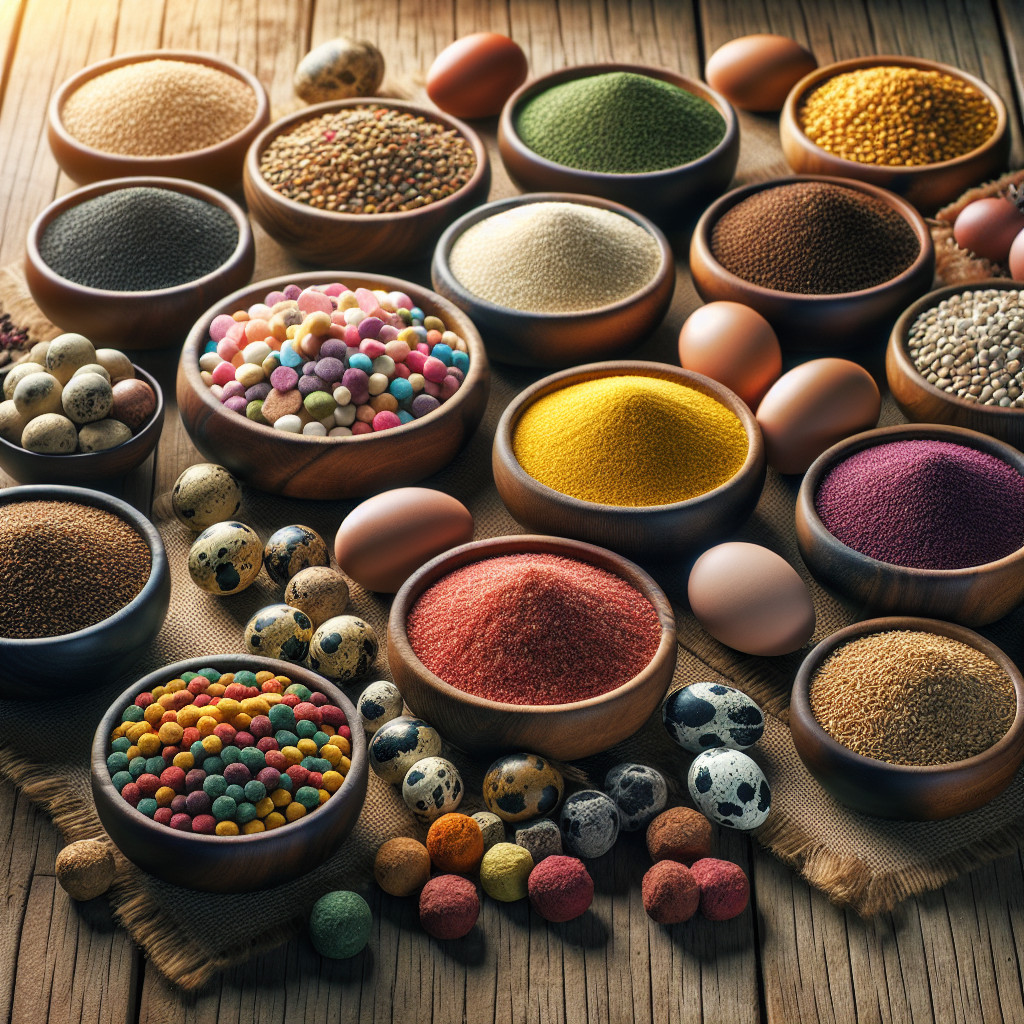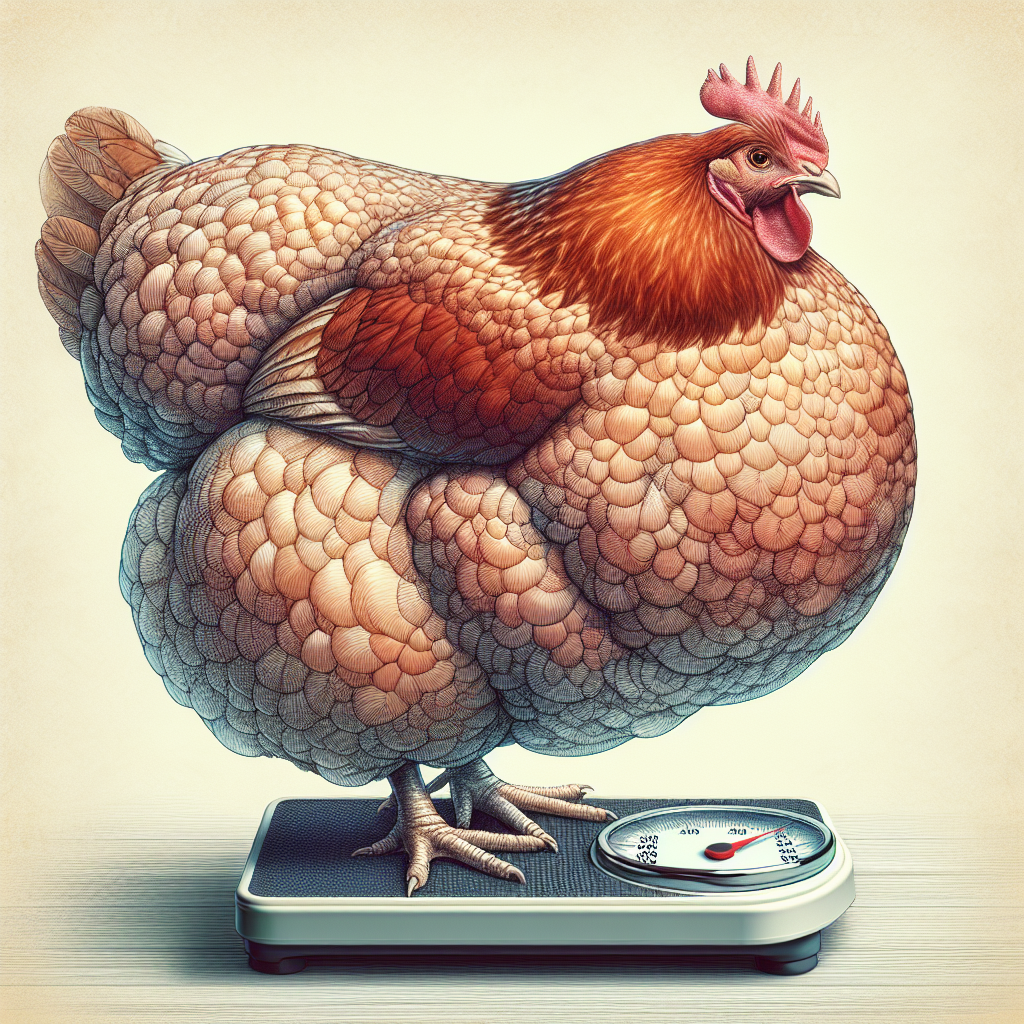In this article, you will explore the fascinating world of poultry nutrition and uncover whether there are specific feed formulations for different stages of a chicken’s life. From adorable fluffy chicks to fully-grown hens and roosters, you’ll learn how nutrition plays a crucial role in their growth and development. Get ready to unravel the mysteries of what goes into feeding these feathered creatures at various stages and unlock the secrets to keeping your chickens healthy and thriving. So grab a cozy spot and prepare to embark on a journey that will leave you clucking with newfound knowledge!
Chick Starter Feed
Composition
Chick starter feed is specifically formulated to meet the nutritional needs of young chicks. It typically consists of a blend of grains, proteins, vitamins, and minerals. The composition may vary slightly depending on the brand, but the main ingredients usually include corn, soybean meal, wheat, vitamins A, D, and E, and minerals like calcium and phosphorus.
Nutrient Requirements
Chicks require certain nutrients to support their growth and development. The starter feed is designed to provide these essential nutrients in the right proportions. Some of the key nutrients included in chick starter feed are protein, carbohydrates, fats, vitamins, and minerals. Protein is crucial for muscle development, while carbohydrates provide energy. Fats are important for healthy brain function, and vitamins and minerals support overall growth and immune system health.
Feeding Period
Chick starter feed should be provided to chicks from the day they hatch until they are around 6 to 8 weeks old. During this period, chicks experience rapid growth and require a higher protein content in their diet. It is important to ensure a constant supply of fresh water alongside the feed to keep the chicks well-hydrated.
Grower Feed
Composition
Once chicks have grown past the starter phase, they can transition to grower feed. This feed is formulated to support steady growth while providing the necessary nutrients. The composition of grower feed is similar to that of chick starter feed but with a slightly different protein content. It generally contains a lower percentage of protein compared to starter feed.
Nutrient Requirements
As chicks transition into the grower stage, their nutritional needs change. Grower feed still contains important nutrients like protein, carbohydrates, fats, vitamins, and minerals, but in slightly different proportions. The lower protein content in grower feed is designed to support steady growth rather than rapid growth seen during the chick stage. Adequate vitamins and minerals ensure proper bone development and a healthy immune system.
Feeding Period
Grower feed is typically provided to young chickens from around 6 to 16 weeks of age. During this stage, chickens are growing and developing their skeletal structure, feathers, and internal organs. The nutrients in grower feed help support these processes and ensure the birds reach their full potential.
Developer Feed
Composition
Developer feed is the next stage of chicken feed, designed for birds that have outgrown the grower feed and are not yet ready for layer feed. It has a different composition compared to earlier feeds, with a focus on maintaining optimal health and preparing the birds for egg production. The protein content is usually lower compared to grower feed and the inclusion of specific ingredients may vary.
Nutrient Requirements
Developer feed aims to sustain the overall health and condition of the birds. It provides a balance of essential nutrients, such as protein, carbohydrates, fats, vitamins, and minerals. The specific nutrient requirements may vary depending on the breed and intended purpose of the chickens. However, developer feed generally contains the necessary ingredients to support muscle development, maintain healthy feathers, and prepare the birds for the laying stage.
Feeding Period
The feeding period for developer feed can vary based on the breed and the desired purpose of the chickens. In general, developer feed is provided to chickens from around 16 to 20 weeks of age. During this time, the birds continue to mature and develop before they begin laying eggs. It is crucial to monitor their health and adjust the feed accordingly to ensure their nutritional needs are met.
Layer Feed
Composition
Layer feed is specifically formulated for hens that have reached the point of lay. This type of feed differs from previous stages as it contains higher levels of certain nutrients that support productive egg-laying. The composition may include ingredients such as corn, soybean meal, calcium, and other essential vitamins and minerals.
Nutrient Requirements
Hens that are in the laying stage have specific nutrient requirements to support egg production. Layer feed provides a balanced combination of protein, carbohydrates, fats, vitamins, and minerals necessary for healthy egg-laying. The feed is particularly enriched with calcium to help develop strong eggshells. It also contains other key nutrients that support overall health, hormone regulation, and reproductive functions.
Feeding Period
Layer feed is given to hens once they reach the point of lay, typically around 20 weeks of age. It is essential to provide a constant supply of layer feed along with fresh water to ensure the hens receive the necessary nutrition for their reproductive needs. The feeding period for layer feed continues throughout the hen’s productive life.
Broiler Feed
Composition
Broiler feed is specially formulated to meet the rapid growth needs of broiler chickens. The composition of broiler feed typically consists of a higher protein content as compared to other feeds. It includes ingredients such as corn, soybean meal, wheat, vitamins, minerals, and sometimes additives like growth promoters or antibiotics.
Nutrient Requirements
Broiler chickens require high levels of protein and energy to support their rapid growth. The nutrient requirements for broiler feed focus on meeting these needs. The feed provides an ideal balance of protein, carbohydrates, fats, vitamins, and minerals to promote efficient muscle development, energy utilization, and overall health. The specific nutrient requirements may vary depending on the genetic strain and growth rate of the broiler breed.
Feeding Period
Broiler feed is given to chickens from the time they are ready for weaning, usually around 3 weeks of age, until they reach market weight, which is typically around 6 to 7 weeks. During this relatively short feeding period, broiler chickens experience rapid growth and require a carefully balanced diet to support their development and ensure healthy meat production.
Breeder Feed
Composition
Breeder feed is specifically formulated to meet the unique nutritional needs of breeder chickens. It is designed to support optimal reproductive performance, fertility, and egg quality. The composition of breeder feed may include a combination of grains, protein sources, fats, vitamins, minerals, and other additives tailored for breeders.
Nutrient Requirements
Breeder chickens have different nutrient requirements compared to those in the growing or laying stages. Breeder feed provides the essential nutrients needed for the birds’ reproductive functions, such as protein, carbohydrates, fats, vitamins, and minerals. It is crucial to maintain the right balance of nutrients to support successful breeding, egg production, and healthy offspring.
Feeding Period
Breeder feed is given to chickens that are intended for breeding purposes. The feeding period may vary depending on breeding plans and breed-specific recommendations. Typically, breeder feed is provided from the time the birds reach sexual maturity and continue throughout the breeding season. Proper nutrition during this period is essential for maximizing fertility, hatching rates, and overall reproductive success.
Turkey Starter Feed
Composition
Turkey starter feed is specially formulated to meet the nutritional needs of young turkey poults. It typically consists of a combination of grains, proteins, vitamins, and minerals, similar to chick starter feed. However, turkey starter feed may have slightly different proportions and ingredients to cater to the nutritional requirements of turkeys.
Nutrient Requirements
Turkey poults have specific nutrient requirements to support their growth and development. The starter feed for turkeys provides the essential nutrients in the right proportions. These nutrients include protein, carbohydrates, fats, vitamins, and minerals necessary for healthy muscle development, bone growth, and overall turkey poult health.
Feeding Period
Turkey starter feed must be provided to turkey poults from the time of hatching until they are around 6 to 8 weeks old, similar to chicks. During this period, turkey poults experience rapid growth and require a higher protein content to support their development. Adequate access to fresh water alongside the feed is crucial to keep the poults hydrated and healthy.
Turkey Grower Feed
Composition
Turkey grower feed is the next stage of feed for growing turkeys. Similar to other grower feeds, it is formulated to support steady growth while providing the necessary nutrients. The composition of turkey grower feed may include grains, proteins, fats, vitamins, and minerals, with slight variations to cater to the specific nutritional needs of turkeys.
Nutrient Requirements
As turkey poults transition into the grower stage, their nutritional needs change. Turkey grower feed provides a balanced combination of protein, carbohydrates, fats, vitamins, and minerals to support healthy growth and development. The nutrient requirements may differ slightly from chick or chicken grower feeds, as turkeys have unique dietary needs.
Feeding Period
Turkey grower feed is typically provided to young turkeys from around 6 to 16 weeks of age, similar to chicken grower feed. During this stage, turkeys continue to mature, and the nutrients in the grower feed help support their overall growth, feather development, and internal organ development. Monitoring their health and adjusting the feed as needed is crucial during this period.
Turkey Finisher Feed
Composition
Turkey finisher feed is designed to meet the nutritional needs of turkeys in the later stages of growth before market weight. It provides the necessary nutrients to support healthy weight gain and fully develop the turkeys before they are ready for processing. The composition of turkey finisher feed may include grains, proteins, fats, vitamins, minerals, and additives specific to turkey nutrition.
Nutrient Requirements
Turkey finisher feed provides a balance of essential nutrients, including protein, carbohydrates, fats, vitamins, and minerals, to support healthy weight gain and finalize the development of turkeys before processing. The feed is formulated to ensure optimal growth and overall health while maximizing meat quality and yield.
Feeding Period
Turkey finisher feed is typically given to turkeys during the final 4 to 8 weeks before processing. It is crucial to closely monitor the turkeys during this stage, as their nutritional needs change as they approach market weight. A well-balanced diet during the finisher stage contributes to optimal meat production and ensures the turkeys are healthy and ready for processing.
Summary
In conclusion, specific feed formulations are indeed essential for different stages of a chicken’s life. From chick starter feed to layer feed, and from turkey starter feed to turkey finisher feed, each stage requires a tailored combination of nutrients to support growth, development, and overall health. These feeds are carefully formulated to meet the specific needs of the birds during each stage of their life cycle, providing the necessary proteins, carbohydrates, fats, vitamins, and minerals in the right proportions. By providing the appropriate feed at the right stages, poultry farmers can support the birds’ optimal growth, maximize productivity, and ensure their overall well-being.




